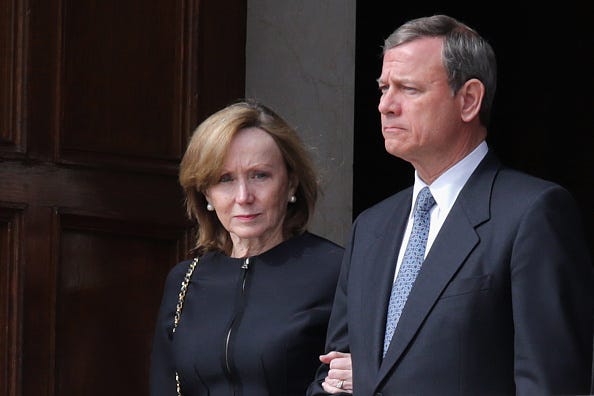Judicial Notice (02.04.23): The Chief
Ethics allegations against Chief Justice Roberts, another big win for Alex Spiro, Jones Day ditches the Donald, and other legal news from the week that was.

I continue to write and speak about ideological diversity, civil discourse, and free speech in the legal profession. On Monday, I had an op-ed in the Boston Globe about these issues in the world of Biglaw, and this coming Monday, I’m participating in a webinar about what law schools can do to promote civil discourse. The other panelists are Paul Clement, Jay Edelson, and Professors Renée Lettow Lerner and Eugene Volokh, with Judge James Ho moderating. Feel free to register here.
Speaking of lively online discussions, Zach Sandberg and I interviewed the remarkable Brian Potts for Movers, Shakers & Rainmakers. A partner in the environmental practice of Perkins Coie, Potts is also an inventor, writer, and founder of the Legal Mentor Network—which you can sign up for here, as mentor or mentee.
Now, on to the news.
Lawyer of the Week: Alex Spiro.
When I interviewed him as my first guest on the Original Jurisdiction podcast, Quinn Emanuel partner Alex Spiro explained how he rejects a lot of conventional wisdom of trial lawyers. So his approach to trying cases might be unusual—but it’s working. At the end of a three-week trial, jurors deliberated for only an hour before ruling in favor of Elon Musk, Spiro’s longtime client. The jury concluded that Musk was not liable for losses sustained by investors after his “funding secured” tweet in 2018, in which he claimed investor support to take Tesla private at $420 a share.
I viewed this case as a tough one for Musk—just like the “pedo guy” trial, in which Spiro also prevailed—and I wasn’t alone. Before trial, Judge Edward Chen (N.D. Cal.) ruled that Musk’s tweets were untrue and that Musk had acted recklessly in posting them, and Judge Chen instructed the jury accordingly. So as Professor Adam Pritchard put it, “I thought [Musk] was crazy to try his chances at trial, given the stakes involved. You’re fighting with one hand behind your back in that situation—and yet he won.” When it comes to jury trials, underestimate Alex Spiro at your peril.
Other lawyers in the news:
Mark Pomerantz, the former Paul, Weiss partner who joined the Manhattan District Attorney’s Office to serve as a special assistant district attorney investigating former president Donald Trump, published a new book about his work on that matter—and could get disbarred over it, if publication is found to violate Pomerantz’s ethical duties, such as not making public statements about confidential information and not opining on a subject’s guilt. Pomerantz told the New York Law Journal that his book is “legal, ethical, and in the public interest.”
Speaking of Trump’s legal troubles, Doug Letter spent much of his time as general counsel to the U.S. House of Representatives investigating the ex-president. But now that Republicans are back in control of the House, Letter has a successor: Matthew Berry, an alum of the Justice Department’s Office of Legal Counsel, the Federal Communications Commission, and Akin Gump. Berry, who is openly gay, is a former law clerk to Justice Clarence Thomas.
And speaking of Trump’s legal antagonists, the Washington Post just profiled former Fourth Circuit judge J. Michael Luttig. He never became Justice Luttig, but in the words of acclaimed SCOTUS advocate Neal Katyal, “There’s a good argument that Judge Luttig, by not being on the Supreme Court, did more for our democracy than most any sitting Supreme Court justice or past one.”
In memoriam:
Prominent professor R. Kent Greenawalt, who taught at Columbia Law School for five decades, passed away at 86.
Henry R. “Harry” Lord, a former assistant U.S. attorney and Maryland deputy attorney general who was active in his state’s civic and cultural affairs, passed away at 84.
May they rest in peace.
Judge of the Week: Chief Justice John Roberts.
Another week, another controversy involving the Supreme Court. And this time it involves someone who generally stays out of trouble: Chief Justice John Roberts.
Keep reading with a 7-day free trial
Subscribe to Original Jurisdiction to keep reading this post and get 7 days of free access to the full post archives.



